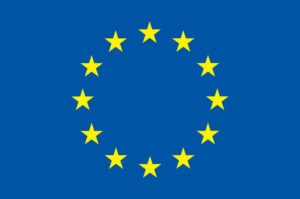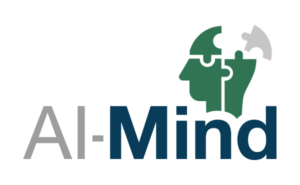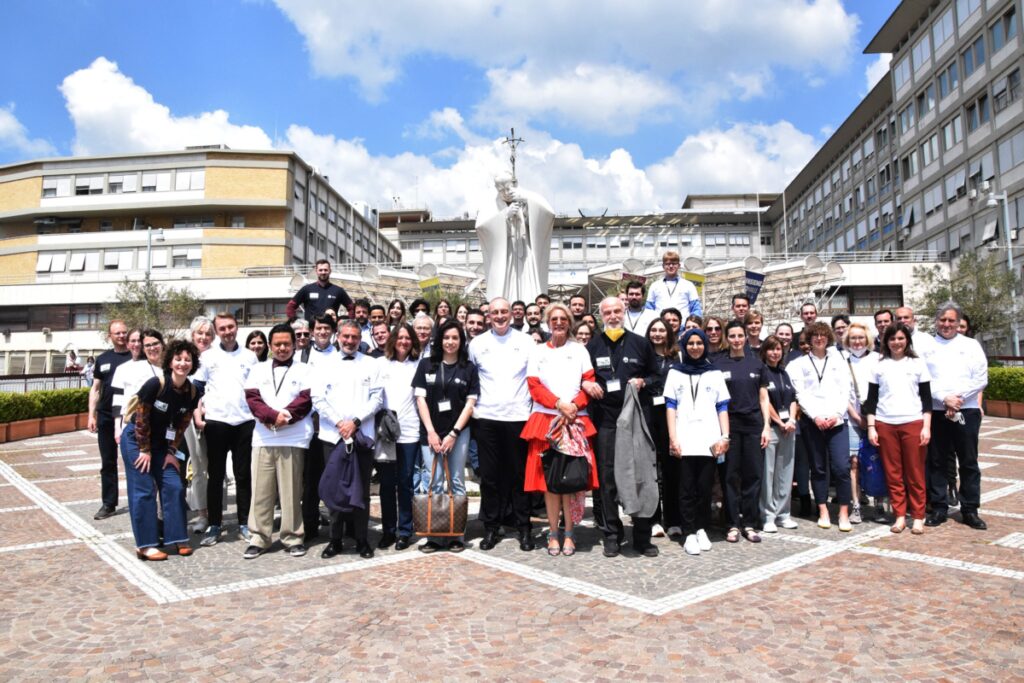The 4th AI-Mind General Assembly meeting closes the first year of the project duration
The 4th AI-Mind General Assembly (GA) meeting was an exceptional event bringing together more than 70 participants, including clinicians, health technology assessment (HTA), artificial intelligence (AI) and ethics experts, researchers, students and specialists from other fields involved in the AI-Mind project. The meeting, held in a hybrid form, took place from 4-5 May. In-person event was hosted by two prominent health institutions, AI-Mind partners – Università Cattolica Del Sacro Cuore (UCSC) and San Raffaele Roma (IRCCS) in Rome.
The agenda filled with more than twenty presenters sharing their research progress and expertise during lectures and workshop sessions ensured the space for fruitful exchange.
Prof. Paolo Rossini and Prof. Americo Cicchetti kicked off the meeting, welcoming partners who joined both in person and online. The official inauguration of the 4th #AIMindGA was given by Prof. Paolo Calabresi (POLICLINICO GEMELLI) who emphasized the importance of the scientific discussion as a key part of tackling the societal challenges, such as dementia prevention.
THE FIRST DAY OF THE 4TH #AIMINDGA

Dr. Ira Haraldsen
Following the opening words, Dr. Ira Haraldsen (OUS), the project coordinator, reflected on the extraordinary progress made during the first year of the AI-Mind project: I am so proud of what we have achieved in just one year! – she stated.
Within the session “Overview of the project progress”, Dr. Haraldsen summarised the performed activities and highlighted that thanks to the great commitment of the project partners, AI-Mind is well on track.
During its first year, AI-Mind has made unquestionable progress and all the anticipated achievements have been reached. These include the introduction of general management and governance rules for AI-Mind solution, the principles for clinical and technical data collection within the AI-Mind study, the software structure (software architecture) and the requirements for software development, as well as the initial AI model explorations. The AI-Mind clinical study that will validate the AI-based tools, has been initiated and the first participants have been enrolled since January 2022. In addition, the first ethical, social, and economic cost-benefit investigations that will assess the feasibility and viability of the “under-development” tools have been prospectively implemented.

Prof. Camillo Mara

Prof. Hanna Renvall

Dr. Signe Daugberg
After the presentation of the project coordinator, Prof. Camilo Marra (UCSC) and Prof. Hanna Renvall (HUS) shared the first observations from the study process and the electroencephalography (EEG) data collection. The following session of the meeting explored the HTA of AI-based health technologies, where Dr. Signe Daugberg (UCSC) described the issues and concerns to address when implementing AI-supported technologies.

Dr. Anis Yazidi

Dr. Luis Peña

Dr. Tim Govers

Robin Vermeulen

Dr. Dianne Gove
A closer look at the “heart-beat” of the AI-Mind platform, namely the AI model and the architecture development was given by Prof. Anis Yazidi (OsloMet) and Dr. Luis Peña (Lurtis). This was followed by Dr. Tim Govers and Robin Vermeulen (Radboudumc) explaining the value of the Early HTA applied in AI-Mind with a focus on economic aspects. Further on, Dr. Dianne Gove (Alzheimer Europe) held a talk on the importance of the ethical approach in dementia risk estimation.
In view of the trustworthiness issues related to the use of AI in the health sector, a very inspiring comment came from Prof. Sonia Sousa (TLU) regarding the human-machine relationship:
A human-machine relationship is very important, we need to understand how the data is processed and how it is provided to humans. With the user interface, we can communicate the common language.
Besides, on the first day of the 4th #AIMindGA two special guests gave their lectures on:
- Pre-MCI and SCD condition: operative definition and markers of progression – Prof. Frank Jensen (University of Cologne, Germany)
- A comparison of operational definitions for Mild Cognitive Impairment – Dr. Michael Wagner (University Hospital Bonn, Germany).
THE SECOND DAY OF THE 4TH #AIMINDGA

Prof. Paolo Mria Rossini
The second and the final day of the 4th #AIMindGA meeting kicked off with a warm welcome from Prof. Paolo Mario Rossini at the IRCCS site: We are working together, so today we have a chance to discuss within the AI-Mind network our further steps.

Federico Ramirez

Dr. Ricardo Bruña

Dr. Mia Liljeström

Antti Kinnunnen
The first part of the day was filled with meaningful discussions on the AI-Mind study that combines two domains, data collection and analysis with a clinical dimension of screening people with mild cognitive impairment (MCI) that volunteered to participate in the study. Federico Ramirez and Dr. Ricardo Bruña from the team of Prof. Fernando Maestù (UCM) explained the increasing relevance of the Brain Imaging Data Structure (BIDS) standard used for organising, annotating and describing neuroimaging data applied in the AI-Mind study. In the following presentation, Dr. Mia Liljeström and Antti Kinnunnen (HUS) elaborated on the assessment of the data quality from the EEG and magnetoencephalography (MEG) screening methods used in the study. Clinical partners used the opportunity to share their experience from the daily practice and procedures employed in the study.

Joanna Plesniak

Andreia Cruz

Dr. Jeanette Müller
The morning exchange demonstrated that the open dialogue in complex and multidisciplinary projects such as AI-Mind are key elements contributing to their success. Quite a different part, yet of vast significance is effective communication, dissemination and exploitation of the project and its results as well as efficient coordination. Joanna Plesniak (accelCH) explained what outreach strategies will be implemented by AI-Mind whereas Andreia Cruz (accelCH) moderated the discussion about management aspects. Following this, Dr. Jeanette Müller (accelCH) explained how the innovation management process is tailored to AI-Mind needs.
Moreover, similar to the first day, two lectures were given on the second day of the 4th #AIMindGA:
- Biomarker dynamics predicting neurodegeneration and clinical progression in pre-symptomatic Alzheimer’s disease – Mathias Toft (OUS)
- Uncertainties and limitations of AI – Ainar Drews (USIT, UiO)
Towards the end of the meeting, Oana Bodron, the European Union project officer commented on top passionate researchers, who take their work very seriously and are committed to its goal of bringing a positive shift in the health sector.
We would like to thank the AI-Mind management team, organisers from IRCCS and UCSC, speakers and all participants who made the 4thAI-Mind General Assembly indeed a forum, in this case very much a Roman one, of scientific discussions to foster breakthroughs in brain research.


